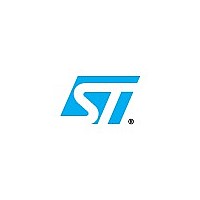ST7260E1 STMicroelectronics, ST7260E1 Datasheet - Page 77

ST7260E1
Manufacturer Part Number
ST7260E1
Description
LOW SPEED USB 8-BIT MCU FAMILY WITH UP TO 8K FLASH/ROM AND SERIAL COMMUNICATION INTERFACE (SCI)
Manufacturer
STMicroelectronics
Datasheet
1.ST7260E2.pdf
(139 pages)
Specifications of ST7260E1
4 Or 8 Kbytes Program Memory
high density Flash (HDFlash), or FastROM with readout and write protection
- Current page: 77 of 139
- Download datasheet (2Mb)
ST7260xx
Note:
Noise error
Oversampling techniques are used for data recovery by discriminating between valid
incoming data and noise. Normal data bits are considered valid if three consecutive samples
(8th, 9th, 10th) have the same bit value, otherwise the NF flag is set. In the case of start bit
detection, the NF flag is set on the basis of an algorithm combining both valid edge
detection and three samples (8th, 9th, 10th). Therefore, to prevent the NF flag getting set
during start bit reception, there should be a valid edge detection as well as three valid
samples.
When noise is detected in a frame:
●
●
●
The NF flag is reset by a SCISR register read operation followed by a SCIDR register read
operation.
During reception, if a false start bit is detected (e.g. 8th, 9th, 10th samples are
011,101,110), the frame is discarded and the receiving sequence is not started for this
frame. There is no RDRF bit set for this frame and the NF flag is set internally (not
accessible to the user). This NF flag is accessible along with the RDRF bit when a next valid
frame is received.
If the application Start Bit is not long enough to match the above requirements, then the NF
Flag may get set due to the short Start Bit. In this case, the NF flag may be ignored by the
application software when the first valid byte is received.
See also
Framing Error
A framing error is detected when:
●
●
When the framing error is detected:
●
●
●
The FE bit is reset by a SCISR register read operation followed by a SCIDR register read
operation.
The NF flag is set at the rising edge of the RDRF bit.
Data is transferred from the Shift register to the SCIDR register.
No interrupt is generated. However this bit rises at the same time as the RDRF bit
which itself generates an interrupt.
The stop bit is not recognized on reception at the expected time, following either a de-
synchronization or excessive noise.
A break is received.
The FE bit is set by hardware
Data is transferred from the Shift register to the SCIDR register.
No interrupt is generated. However this bit rises at the same time as the RDRF bit
which itself generates an interrupt.
Noise error
causes.
Serial communications interface (SCI)
77/139
Related parts for ST7260E1
Image
Part Number
Description
Manufacturer
Datasheet
Request
R

Part Number:
Description:
LOW SPEED USB 8-BIT MCU FAMILY WITH UP TO 8K FLASH/ROM AND SERIAL COMMUNICATION INTERFACE (SCI)
Manufacturer:
STMICROELECTRONICS [STMicroelectronics]
Datasheet:

Part Number:
Description:
STMicroelectronics [RIPPLE-CARRY BINARY COUNTER/DIVIDERS]
Manufacturer:
STMicroelectronics
Datasheet:

Part Number:
Description:
STMicroelectronics [LIQUID-CRYSTAL DISPLAY DRIVERS]
Manufacturer:
STMicroelectronics
Datasheet:

Part Number:
Description:
BOARD EVAL FOR MEMS SENSORS
Manufacturer:
STMicroelectronics
Datasheet:

Part Number:
Description:
NPN TRANSISTOR POWER MODULE
Manufacturer:
STMicroelectronics
Datasheet:

Part Number:
Description:
TURBOSWITCH ULTRA-FAST HIGH VOLTAGE DIODE
Manufacturer:
STMicroelectronics
Datasheet:

Part Number:
Description:
Manufacturer:
STMicroelectronics
Datasheet:

Part Number:
Description:
DIODE / SCR MODULE
Manufacturer:
STMicroelectronics
Datasheet:

Part Number:
Description:
DIODE / SCR MODULE
Manufacturer:
STMicroelectronics
Datasheet:

Part Number:
Description:
Search -----> STE16N100
Manufacturer:
STMicroelectronics
Datasheet:

Part Number:
Description:
Search ---> STE53NA50
Manufacturer:
STMicroelectronics
Datasheet:

Part Number:
Description:
NPN Transistor Power Module
Manufacturer:
STMicroelectronics
Datasheet:










